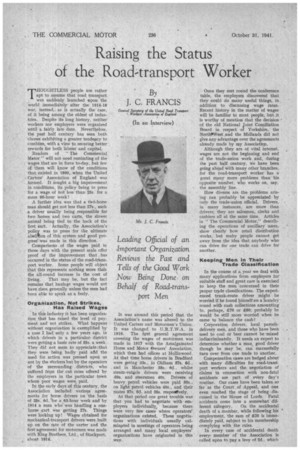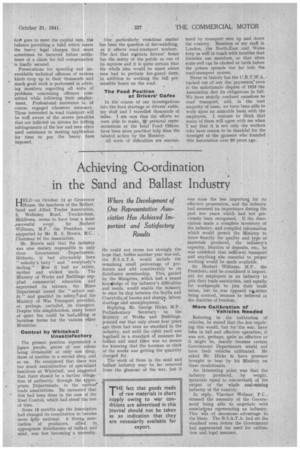Raising the Status
Page 22

Page 25

If you've noticed an error in this article please click here to report it so we can fix it.
of the Road-transport Worker
By J. C. FRANCIS
General Seererary of the Uniled Road Transport Workers Association of England (In an Interview) • Leading Official of an Important Organization Reviews the Past and Tells of the Good Work Now Being Done on Behalf of Road-trans
, port Men
THOUGHTLESS people are rather apt to assume that road transport was suddenly launched upon the world immediiteIyafter the 1914-18 ' war, instead, • as is actually the case, of it being among the oldest of industries. Despite its long history, neither workers nor employers were organized until a fairly late date. Nevertheless, the past half century has seen both classes exhibiting a greater tendency to combine, with a view to securing better rewards for both labour and capital.
Readers of "The Commercial Motor" will not-need reminding of the wages that are in force to-day, but few of them will know of the conditions that existed in 1890, when the United Carters' Association of England was formed. It sought a big improvement in conditions, its policy being to press for a wage of not less than 25s. for a mere 60-hour week!
A further idea was that a tied-horse man should get not less than 27s., such
' a driver usually being responsible for two horses and two carts, the slower animal being tied to the back of the first_ cart. Actually, the Association's policy was to press for the ultimate abolMon of this system and good progress' was made in this direction.
Comparisons of the wages paid in those days with the present scale offer proof of the improvement that has occurred in the status of the road-transport worker. Some people will object that this represents nothing more than the all-round increase in the cost of living.That may be, but the fact remains that haulage wages would not have risen generally unless the men had been able to speak as a body.
Organization, Not Strikes, Has Raised Wages
In this industry it has been organization that has raised the level of payment and not strikes. What happens without organization is exemplified by a case I had only a few years ago, in which drivers in a particular, district were getting a basic rate of 35s, a week. They did not seem to appreciate that they were being badly paid mid the need for action was pressed upon us not by the workers but by the operators of the surrounding districts, who safferecl from the cut rates offered by the employers in the particular town where poor wages were paid.
In the early days of this century, the Association included various agreements for horse drivers on the basis of 25s. 6d. 'for a .63-hour week and by 1914 a man who was handling a onehorse cart was getting 27s. Things were looking up! Wages obtained for mechanical-transport drivers were built up on the rate of -the carter and the first agreement for motormen was made with King Brothers, Ltd., of Stockport, about 1914. It was around this period that, the Association's name was altered to the United Carters and Motormen's Union. It was changed to U.R.T.W.A. in 1919. The first general agreement covering the wages of motormen was made in 1917 with the Amalgamated Horse and Motor Owners' Association, which then had offices at Hollinwood. At that time horse drivers in Bradford were geting 33s., in Oldham 37s, ed., and in Manchester 38s. ed., whilst steam-vehicle drivers were receiving 50s. and steersmen 40s. Drivers of heavy petrol vehicles were paid 50s., on light petrol vehicles 40s., and t.13eir mates 37s. 6d. and 35s. respectively.
• At that period one great trouble was that you had to 'negotiate with employers individually, because there were very few cases where operators' organizations existed. These negotiations with individuals usually culminated in meetings of operators.being arranged and many local employers' organizations have originated in this way.
Once they met round the conference table, the employers discovered that they could do many useful things, in addition to discussing wage rates. Recent history in the matter of wages will be familiar to most people, but it is worthy of mention that the decision of the old National joint Conciliation Board in respect of Yorkshire, the North*West and the Midlands did not give any advantage over the agreements already made by ray Associatiop.
Although they are of vital interest, wages are not the beginning and end of the trade-union work and, during the past half century, We have been going ahead with many other branches, for the road-transport worker has a great many more problems than his opposite number, who works on, say, the assembly line.
How diverse are the problems arising can probably be appreciated by only the trade-union official. Drivers,
many instances, are more than drivers; they, are salesmen, clerks and cashiers all at the same time. Articles in "The Commercial Motor," describing the operations of ancillary users, show clearly how retail distribution works, but maby people cannot get away from the idea that anybody who can drive for one trade can drive for another.
Keeping Men in Their Trade Classification
In the course of a year we deal with many' applications from employers for. suitable staff and great care is exercised to keep the menn, concerned in their proper trade classifications. The experienced trunk-route driver might be worried if he found himself on a laundry round with cash collections amounting to, perhaps, £70 or £80; probably he would be still more worried when he came to balance the cash!
Corporation drivers, local parcel'sdelivery men, and those who have been used to coal or beer cannot be • mixed indiscriminately. It needs an expert to determine whether a man, good driver though he may be, can successfully turn over from one trade -to another.
Compensation cases are hedged about with many difficulties for road-transport workers and the negotiation of claims in connection with non-fatal accidents are part of every day's routine. Our cases have been taken so far as the Court of Appeal, and one even reached the stage of being discussed in the House of Lords. Fatal accidents come into a somewhat dif
ferent category. On the accidental death of a member, while following his employment, the sum of £20 is immediately paid, subject to his membership complying with the rules. , In every case of accidental death every. member of the Association is called upon to pay a levy of 2d., which firs* goes to meet the capital sum, the balance providing a fuhd which meets the heavy legal charges that must sometimes be incurred before settlement of a claim for full compensation is finally secured. Prosecutions for speeding •and unavoidable technical offences of various kinds crop up in their thousands and much good work is performed in advising members regarding all sorts of problems concerning offences committed while folldwing their employ ' count. Professional assistance is, of course, engaged whenever necessary. Those interested in road transport will be well aware of the severe penalties that are inflicted on drivers for trifling infringements of the law'and men often need assistance in making application for time to pay the heavy fines imposed. One particularly vex^atious matter has been the question of fire-watching, as it affects road-transport, workers. The Act that reetricts drivers' hours has the safety of the public as one of its motives and it is quite certain that the whole idea would be upset where men had to perform fire-guard duty, in addition to working the full permissible hours on the road.
The Food Position at Drivers Cafes
In the course of our investigations into the food shortage at drivers' cafés, my staff and I travelle1. thousands of miles, I am sure that the efforts we were able to make, 113e personal representations at the local Food Offices, have been more practical help than the belated action by the Ministry.
All sorts of difficulties are encoun tered by transport men up and down the country. Members of my staff in London, the North-East and Wales keep us well in touch with troubles that threaten our members, so that often some evil can be choked at birth before the poison spreads too far info the road-transport system.
Never in history has the U.R.T.W.A. • hacked out of any due payments': even in the unfortunate dispute of 1926 the Association met its obligations in full. We have strictly confined ourselves to road transport, arid, in the vast majority of cases, we have been able to work upon an amicable basis with the employers. I venture to tifink that many of them will agree with me when 'I say that it is not only the workers who have reason to be thankful for the foresight of the pioneers who founded this Association over 50 years ago.




















































